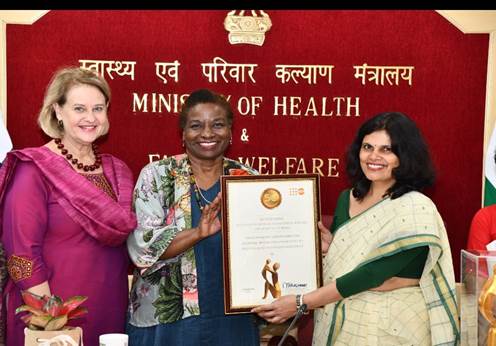New Delhi: The United Nations Population Fund (UNFPA) has recognized India’s significant strides in maternal health and family planning, highlighting the nation’s commitment to improving women’s health and well-being. Dr. Natalia Kanem, Executive Director of UNFPA, presented a plaque and certificate to Smt. Punya Salila Srivastava, Union Health Secretary, as a token of appreciation for India’s remarkable progress in these areas.
During the event, Dr. Kanem emphasized UNFPA’s unwavering partnership with India in advancing maternal health, noting the country’s commendable efforts in reducing the Maternal Mortality Ratio (MMR) by 70% between 2000 and 2020. This progress has positioned India to achieve the Sustainable Development Goal (SDG) target of reducing MMR below 70 before 2030, a milestone that has saved thousands of lives, especially among marginalized communities.
India’s Ministry of Health and Family Welfare has implemented several key programs to improve maternal health, including the Surakshit Matritva Aashwasan Yojana (SUMAN), Pradhan Mantri Surakshit Matritva Abhiyan (PMSMA), and the Midwifery Services Initiative, all of which ensure quality and respectful maternity care.
The recognition ceremony was attended by Smt. Aradhana Patnaik, Additional Secretary and Mission Director of the National Health Mission; Smt. Meera Srivastava, Joint Secretary of Reproductive and Child Health; and other dignitaries including Mr. Pio Smith, UNFPA’s Asia Pacific Regional Director, and Ms. Andrea M. Wojnar, UNFPA India Representative. They commended India’s leadership in global forums on reproductive health, with India holding key positions in the Partnership for Maternal, Newborn & Child Health (PMNCH) and the Family Planning 2030 (FP2030) global partnership.
India’s Family Planning program has also achieved significant success, with the Total Fertility Rate (TFR) now below the replacement level of 2.0. The inclusion of modern contraceptive methods, such as subdermal implants and injectable Depot Medroxyprogesterone Acetate (DMPA), has expanded contraceptive choices for women across the country, further strengthening the program.
As UNFPA commemorates 50 years of partnership with India, this event serves as a significant milestone in their shared mission to ensure the health and well-being of every woman, girl, and young person as India progresses toward its vision of a ‘Viksit Bharat’.





